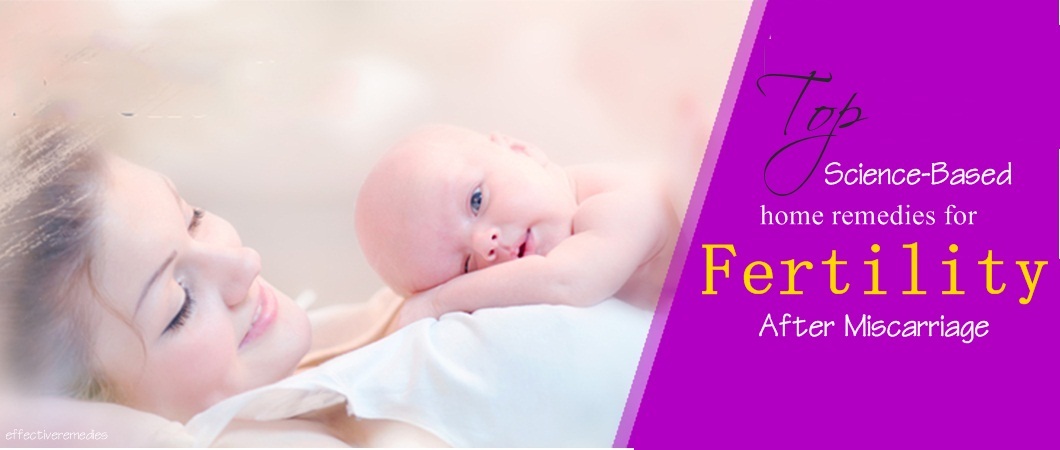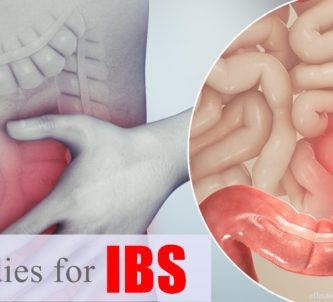Updated: 12/06/2019
Contents
The ability to have a baby has been a big concern for many people of child-bearing age, especially women. But, do you know exactly how to treat infertility and boost fertility in men and women? Do you know to increase the fertility after miscarriage? The fact is that what we do know is far less than what we should know. The American Infertility Association released that just only one in over 12,000 could answer 15 questions about the reproductive life cycle. It means that almost all of us have poor awareness about this serious issue. Today’s article is going to give you the most effective natural home remedies for fertility after miscarriage and amazing facts about this issue. Continue reading this article to find out more about these natural home treatments and then find one way that is suitable for you.
- Top 21 effective remedies for PCOS
- Top 13 natural cures for ovarian cysts pain relief
- Top 10 solutions to take care after abortion
Top 10 Simple-but-Effective Home Remedies for Fertility After Miscarriage
I. Effective Remedies
The recipes we've focused on are traditional home remedies, so always consult your doctor and check out your health condition regularly to know if a remedy is working for you.
1. Ashwagandha
Why: Ashwagandha, also known as Indian ginseng, is a useful herb in boosting conceiving ability in women. Ashwagandha may help stimulate fertility and enhance reproductive health, particularly in men[1] [2]. It helps maintain the hormonal balance and promote the proper function of the reproductive organs. It also tones the uterus in women with recurrent miscarriages. Moreover, this remedy helps reduce stress level.
What you need:
– Ashwagandha powder: 1 tablespoon.
EffectiveRemedies Partner Solutions

Ask a Doctor Online and Get Answers in Minutes, Anytime!
Have medical questions? Keep asking questions to a Verified Expert until you get the answer you need.
– A glass of warm water.
How to do: Mix a teaspoon of powdered ashwagandha in a glass of warm water to make a tea and drink twice a day.
Warnings: Do not use large doses of ashwagandha to avoid diarrhea, vomiting, and stomach upset. Do not use this herb when you are having pregnancy and breastfeeding, or suffering from diabetes, high and low blood pressure, stomach ulcers, surgery, thyroid disorders, and auto-immune diseases.
2. Pomegranate
Why: Pomegranate promotes the blood circulation through the uterus and makes the uterine lining thicker to reduce the risk of miscarriage[3]. It also boosts the healthy development of your fetus. A study in 2015 showed that taking a pomegranate supplement may enhance longevity, growth rate, and fertility in women[4].
What you need:
– Powdered pomegranate seeds
– Bark
– Warm water
How to do: Mix pomegranate seed powder with bark at an equal rate and store that mixture in an airtight jar. Dilute the ½ teaspoon of the mixture in a glass of warm water to make the tea. Drink this solution twice every day for several weeks. Or else, you can consume raw fresh pomegranate fruit or drink the juice extracted from this fruit.
Warnings: Make sure that you’re not allergic to pomegranate. Do not consume pomegranate peel, root, and stem as they are poisonous. Do not drink pomegranate juice when having low blood pressure. Stop consuming pomegranate at least 2 weeks before surgery.
3. Cinnamon
Why: Cinnamon boosts the functions of ovaries and helps women get pregnant easier. According to a study, cinnamon may treat polycystic ovarian syndrome (PCOS) – a cause of infertility, and promote the menstrual cyclicity in women[5]. It also treats many problems, such as amenorrhea, uterine fibroids, and endometriosis and prevents yeast infections.
What you need:
– Cinnamon powder: 1 teaspoon.
– Hot water: 1 cup
How to do: Mix 1 teaspoon of powdered cinnamon in 1 cup of hot water and drink this tea once every day for a couple of months. Alternatively, you can sprinkle the powdered cinnamon on your yogurt, oatmeal, and cereal and consume it in your diet.
Warnings: Do not take more than 2 teaspoons of cinnamon every day. Do not use a large amount of cinnamon in a long term of time. Do not use this spice in sensitive individuals or people with liver diseases. Be careful when using it for women with pregnancy or breastfeeding, children, diabetes patients, and people having diseases in the liver. Avoid consuming it before surgery for 2 weeks.
4. Chasteberry
Why: This herbal remedy helps improve fertility in women effectively. It works as a vitex(? what does that mean?) which rebalances the hormone in the body and improves ovulation thanks to the high prolactin levels to get pregnant faster[6]. It also helps treat polycystic ovarian syndrome.
What you need:
– Fresh/dried chasteberry: 1 teaspoon
– A cup of boiling water
How to do: Steep prepared chasteberry in a cup of boiling water, cover the cup and wait for 10 minutes. Use this tea once per day for a few weeks or months. Or else, you can use chasteberry supplements, available in the form of liquid, capsules or tinctures. Consult your doctor before taking this remedy for suitability and proper dosage.
Warnings: Do not use it when having hormone-sensitive diseases, such as breast cancer, people taking antipsychotic drugs, or undergoing in vitro fertilization. Do not take chasteberry if you are pregnant or breastfeeding, taking hormone replacement or birth control pills, Parkinson’s disease drugs or some certain antipsychotic drugs. This herb may cause some side effects, such as headaches, acne, rash, upset stomach, dizziness, weight gain, menstrual bleeding. Stop consuming chaste berry and visit your doctor if you get any unexpected effects above.
5. Dates
Why: Dates are rich in many essential nutrients, which help increase the chain of conceiving in women. They contain a large number of amino acids, vitamins A, B, E, iron, and some other minerals. These nutrients are important to boost the conceiving ability and help women to carry the child through a full-term pregnancy[7]. Dates also help treat constipation and improve regular bowel movements.
What you need:
– Dates: 10 – 12.
– Chopped coriander root: 2 tablespoons.
– Cow’s milk: ¾ cup.
How to do: Remove the seeds of 10 – 12 dates. Put the pulp of dates and 2 tablespoons of prepared coriander root into a grinder and grind to make a paste. Boil the pasta with ¾ cup of cow’s milk. When it’s cool, drink the solution once every day for one week. Alternatively, you can consume 6 – 8 dates every day as a snack or add chopped dates to smoothies, yogurt or milk to consume.
Warnings: Be careful when consuming dates if you are pregnant or breastfeeding. Do not consume a large amount of this herb at one time.
6. Maca Root
Why: Maca root is an effective herbal remedy in boosting fertility in both men and women[8] [9] [10]. It does stimulate not only normal hormone production but also aid the thyroid function. It is also particularly helpful for women who suffer from hypothyroidism. It also contains many essential nutrients for boosting fertility.
What you need:
– Powdered maca root: ¼ – ½ teaspoon.
– Lukewarm milk/water: 1 cup.
How to do: Mix prepared powdered maca root with one cup of warm milk or water. Drink the mixture once per day for several months. Or else, you can add this herbal powder to the breakfast cereal or smoothies. If you do not want to make these solutions, an easier option is taking maca root supplements after consulting your doctor.
Warnings: It may cause some side effects to your brain and nervous systems, such as headaches, insomnia, and mood swings. Do not use maca root powder when suffering from a thyroid disorder. Avoid consuming maca root if you are pregnant or breastfeeding.
7. Vitamin D
Why: Vitamin D is an important nutrient for pregnant women and the child they are carrying. A deficiency of this essential vitamin can lead to infertility and miscarriage in women. According to a study carried out in 2014, published in the Journal of Clinical Endocrinology and Metabolism, vitamin D plays an emerging part in boosting fertility and IVF outcomes in women[11].
How to do: To get vitamin D, you should expose yourself to the sunlight in the very early morning for at least 10 minutes. You should also consume more foods, which are rich in vitamin D like cheese, egg yolks, salmon, and foods which are fortified with this vitamin. Optionally, you can take vitamin D supplements after consulting your doctor.
Warnings: Do not take a large amount of vitamin D in one time or you will get weakness, sleepiness, fatigue, dry mouth, headache, metallic taste, loss of appetite, nausea, vomiting, and so on. Do not take over 4000 units of vitamin D per day for long periods of time. Breastfeeding and pregnant women are not allowed to take over 4000 units of vitamin D per day. Do not use this vitamin when suffering from kidney disease, high level of calcium in the blood, and atherosclerosis. Be careful when using vitamin D in people with sarcoidosis, histoplasmosis, hyperparathyroidism, lymphoma, and tuberculosis.
8. Banyan Tree Roots
Why: Banyan tree is used as an effective Ayurvedic treatment for infertility. Banyan tree roots may help boost fertility and treat sexual frailty[12]
What you need:
– Banyan tender roots
– A glass of milk
How to do: Dry the prepared banyan roots under the sun for some days. Grind these dried roots into banyan root powder. Store this powder in an airtight container. Every day, take 1 – 2 teaspoons of banyan root powder and mix it in a glass of milk to drink once a day on an empty stomach in a term of 3 consecutive nights after the periods are over. Do not eat anything for 1 hour after drinking the solution. Drink it for a few months.
Warnings: Do not use this herb during constipation and menstrual cycle.
9. Fennel
Why: Fennel is one of the most effective home remedies in boosting female fertility, according to some scientific evidence[13]. This herb further helps boost the ability of conception in heavy set women.
What you need:
– Fennel
– Rose petal jam/pure butter
How to do: You mix 10 grams of powdered fennel with 50 grams of rose petal jam and consume this solution every night with a glass of hot cow’s milk. Also, you mix 6 grams of powdered fennel with 12 grams of pure butter and consume it daily for 3 months.
Warnings: Do not use fennel to treat your problems if you have allergy with some plants like celery, mugwort, carrot, because it may mean that you are allergic to fennel. Be cautious when using it for pregnant or breastfeeding women and children. Do not use it when you have a bleeding disorder or hormone-sensitive conditions, such as uterine cancer, breast cancer, ovarian cancer, uterine fibroids, and endometriosis.
10. Holy Basil
Why: Basil is an effective herb in treating infertility in women[14]. Besides, this is a very simple method to practice if you want to get pregnant.
What you need:
– 4 leaves of basil or basil seeds
How to do: You just have to chew 4 leaves of this herbal plant every day. Then, you can drink a glass of milk. To increase the chance of conception, women can chew some basil seeds daily. Chewing the seeds of this herb during the menstruation period can help treat infertility in women effectively and naturally.
Warnings: Do not take this herb as medicine for a long term of time as it can raise the risk of liver cancer. Do not use it with a large dosage for a long time for pregnant or breastfeeding women, and children. Do not practice this remedy when having bleeding disorders and low blood pressure. Stop using basil for 2 weeks before surgery.
II. How-To Tips
1. Yoga
Yoga is a helpful practice for women to treat fertility problems. This method help women keep fit to boost the chance of female fertility[15]. Yoga is also a powerful remedy to reduce stress and calm your mind and body. You can practice some poses to boost the fertility, like Bhramari Pranayama (Bee Breath), Viparita Karani (Legs-up-the-Wall Pose) Hastapadasana (Standing Forward Bend), Nadi Shodhan Pranayama (Alternate Nostril Breathing), Paschimottanasana (Seated Forward Bend), Janu Sirasana (Head-to-Knee Pose), Yoga Nidra (Yogic Sleep), and Baddha Konasana (Butterfly Pose). You should attend a yoga class or have a yoga expert direct you to practice these poses properly for the greatest benefits.
2. Have A Well-Balanced Diet
A well-balanced diet is an effective and important remedy to improve your fertility[16]. Especially, it is an essential factor for healing the body after the miscarriage. Moreover, a healthy diet will prevent diseases and health conditions like sterility. It also boosts the conceiving ability in women.
A healthy diet includes enough protein-packed foods such as lentils, peas, chickpeas, beans, and spinach. You should also consume more carbohydrates, which contains little glycemic index like whole-wheat bread or brown rice.
Besides, you need to add iron-rich foods in your diet to get rid of ovulation problems. Some foods that contain the essential amount of iron you should consume are leafy green vegetables, beans, beetroot, lean meats, apricots, raisins, dates, and prunes.
As vitamin D is an important nutrient for boosting fertility in women who wish to get pregnant, you should consume a proper amount of vitamin-D-rich foods, such as egg. Fruit and vegetables are very important foods, which provide you with enough antioxidants to stay healthy, young, and fresh. Moreover, you should obtain enough healthy fat to boost fertility, such as omega-3 fatty acids. Some good sources to get these essential healthy fats are seeds, nuts, avocados, and fatty fish.
Apart from that, you should avoid some foods that can be harmful to your bodies such as coffee, strong tea, white sugar, white flour, spicy foods, fried foods, refined cereal, and seafood that are rich in mercury. These foods may cause infertility and reduce the chance of getting pregnant in women. You should also consult the gynecologist to have a balanced and suitable diet which fits you the best.
3. Adequate Sleep
Sleep is a very crucial factor in the regulation and production of many hormones in the body. Much scientific evidence proved that the low levels of melatonin and serotonin production in women could cause a short luteal phase and therefore, preventing women from getting pregnant. Moreover, a sleep deficiency can impair the regulation of insulin, cortisol, and adrenaline of the body[17]. So, having enough sleep is very important to heal the body after the miscarriage and get pregnant fast. You can take a nap whenever you are tired during the day or go to bed earlier than usual. You can sleep in a dark room to maintain the levels of melatonin.
4. Exercise
Another important factor that helps maintain the high levels of fertility is exercise[18]. You can take in some sporting activities like walking, swimming, and other fun sports to improve health and increase the chances of conception.
5. Stress Control
Excessive stress is one of the underlying causes of infertility[19] [20] [21]. Stress will impair the function of your body, including reproductive function. Too much stress leads to high alpha-amylase enzyme levels in your body, which delay the ovulation and affect your reproductive cycle to prevent you from conceiving. Therefore, you need to reduce the stress to increase the chances of getting pregnant. To reduce stress, you can practice some relaxation techniques like yoga, massage therapies, acupuncture, and meditation. Listening to gentle music, reading books, shopping, or doing light exercises are also effective means of relaxation.
6. Water
Water plays a very important role in keeping your body healthy. It makes up 75 percent of your body, and it is essential for our survival. But people little know water is also very vital for fertility and healing process. Appropriate hydration helps transfer hormones and nutrients to the right destinations and aids in lubrication. It also helps rid your body of toxins and avoid urinary infections. You need to drink at least 1500ml of water every day to get rid of complications related to dehydration.
III. Facts About Fertility And Pregnancy
1. You Are Most Fertile Before Your Ovulating Periods
You are most possible to get pregnant when having sex in around five days before you ovulate. It is because when the egg leaves the ovary, the sperm of your partner will have 12 to 24 hours to get to the egg to conceive. However, the sperm can live inside the woman's body for several days or weeks after you get it. So, bluntly, the more swimmers you got in prematurely, the higher chances you have to get pregnant.
2. Tight Shorts Can Reduce Sperm Production In Men
Wearing too tight, which coop up the scrotums, or even increasing one degree in body temperature can reduce the production of sperm in men. A man should keep his body at the temperature of 94oF to 96oF and always wears loose shorts or pants.
3. Your Sense Of Smell Skyrockets During Your Ovulating Period
If you smell funny things all day, it could be the prime time to get pregnant. So, take the chance to make your baby.
4. A Stress-Free Life Could Boost Your Chances Of Conception
A study conveyed at Harvard University showed that 55 percent of women who took part in body and mind programs go pregnant, while that number in the group of women who didn’t practice is 22 percent. It’s obvious that a stress-free life increases the chances of conception. Therefore, you should channel your inner yogi to boost fertility chances.
5. A Woman Only Has 15-Percent Chance Of Getting Pregnant Monthly.
When you have been trying to have a baby for a while, you will frequently notice all the pregnant women sprouting up everywhere around you. Couples in their thirties only have 15-percent chance of getting pregnant per month when having unprotected sex, and it often takes you about 8 months until you have a big fat positive pregnancy test.
6. Clean Teeth Are Necessary
Gum disease can make women have premature delivery and cause low birth weight in the baby[22]. Moreover, poor oral hygiene also causes infections in the guy’s sperm. So, keep cleansing your teeth regularly and go to see your dentist periodically.
7. A Women Looks (Even More) Sexy In Her Ovulation Periods
According to a study conveyed by British researchers, ovulating women look more beautiful and charming than the ones who are not in their ovulating cycles. Ovulating women usually have a softer skin tone, dilated pupils, and fuller lips.
8. You Can Get Pregnant With The Help Of The Pill
Besides regulating your period, you can use the Pill to reduce the risk of ovarian and uterine cancers and increase the chances of conceiving.
9. Heterosexual Porn Makes Men’s Sperm Stronger
Some studies proved that men produce more powerful sperm after watching heterosexual porn.
10. Full-Fat Dairy Is Powerful In Avoiding Infertility
If you prefer non-fat dairy products as you think it is good for you, you should think twice. Research showed that full-fat dairy would provide you with essential high levels of progesterone and estrogen hormones and reduce the chances of infertility[23].
IV. Frequently Asked Questions
1. “I just had a miscarriage, how do I get my period back?”
What you should do is just giving your body the time to balance everything out and do its work. If you have waited for a few months but the period has still not been returned, you need to try some natural remedies to get it back.
2. “What are my chances of getting pregnant after a miscarriage?”
The statistics indicate that after a miscarriage, you have the same chance of conceiving as in any other cycle.
3. “I just had a miscarriage, what can I do so I can get pregnant right away?”
What you need to do is the same as other normal women who wish to get pregnant. You should eat a well-balanced, healthy and natural diet. Besides, you need to use herbs, natural remedies, and supplements to heal and rebalance your body to get ready for pregnancy. Remember to let your body rest and relax enough and allow your hormones to get back to normal levels. Many doctors say that you can try to make your baby again after your first full cycle of menstruation.
4. “Could the length of my cycle affect my fertility?”
No, actually. Throughout life, you can have various cycles, becoming a little shorter or longer when getting older. Although your cycle is not regular, which makes it harder to know when your ovulation happens, it does not matter too much. Provided that you can determine the days in your cycle when you seem to ovulate, you needn’t worry that the length of your cycle could impair your fertility.
5. “What can my partner and I do to improve our chances of conceiving?”
You two should have frequent intercourse during your cycle to increase the chances of conception. The prime time to have intercourse with your partner is around 5 days before ovulation when you are most fertile. When trying to make your baby, you should be in good health. So, stop smoking and consuming bad foods and drinks like alcohol. Have a healthy diet and consume more fresh vegetables and fruits. Women who wish to get pregnant should take 0.4mg of folic acid per day to avoid having a child with a neural tube defect such as spina bifida.
V. Advice After Treatment
- Try to keep your body at a healthy weight as underweight and overweight are two reasons for infertility.
- Say “No” with caffeinated foods and drinks, alcohol, smoking and secondhand smoking. Caffeine is proved as a cause of infertility and even miscarriage.
- Have intercourse with your partner during your fertile time to boost the chance of conceiving.
- Control your stress level well by meditation, deep breathing and many other relaxing techniques.
- Remember to hydrate your body and drink water at room temp, which will keep your reproductive organs healthy.
- Make your schedule of intercourse according to your ovulation.
These remedies and tips do not only help you treat the problem of infertility but also give you many helpful notices to get pregnant fast and safe. You can use a single method or several ones together for the best result. If you know other effective home remedies for fertility after the miscarriage, do not forget to comment in the box below and let us know what you think. Welcome!
All content provided is for informational and educational purposes. We recommend you consult a healthcare professional to determine which method is appropriate for you.
Read more: Top 12 Proven Home Remedies For Erectile Dysfunction. This article was medically reviewed/fact checked by Dr Julian Nesbitt.








